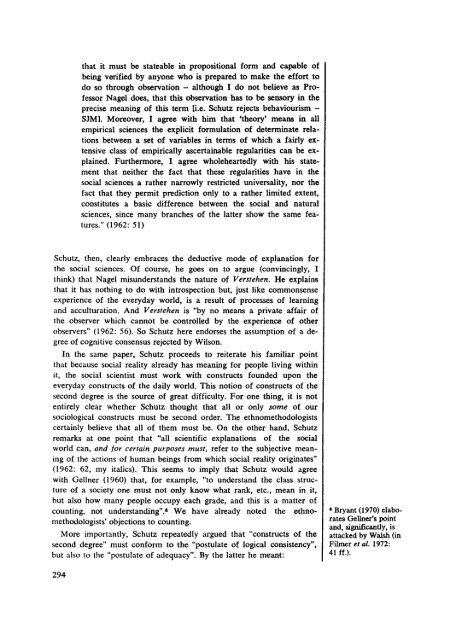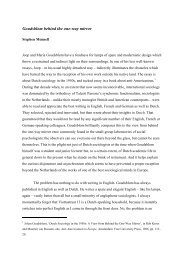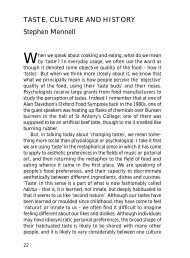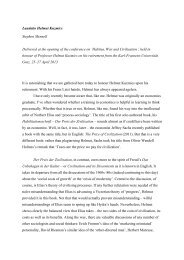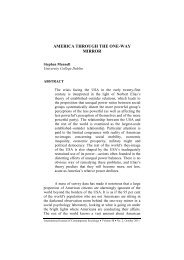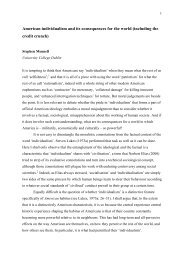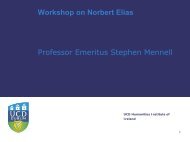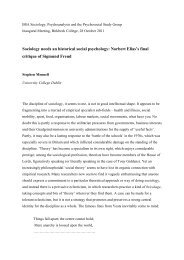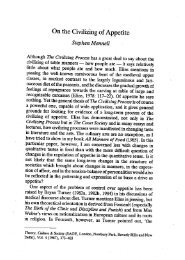Ethnomethodology and the New "Methodenstreit" - Stephen Mennell
Ethnomethodology and the New "Methodenstreit" - Stephen Mennell
Ethnomethodology and the New "Methodenstreit" - Stephen Mennell
Create successful ePaper yourself
Turn your PDF publications into a flip-book with our unique Google optimized e-Paper software.
that it must be stateable in propositional form <strong>and</strong> capable ofbeing verified by anyone who is prepared to make <strong>the</strong> effort todo so through observation - although I do not believe as ProfessorNagel does, that this observation has to be sensory in <strong>the</strong>precise meaning of this term [i.e. Schutz rejects behaviourism -SJMI. Moreover, I agree with him that '<strong>the</strong>ory' means in allempirical sciences <strong>the</strong> explicit formulation of determinate relationsbetween a set of variables in terms of which a fairly extensiveclass of empirically ascertainable regularities can be explained.Fur<strong>the</strong>rmore, I agree wholeheartedly with his statementthat nei<strong>the</strong>r <strong>the</strong> fact that <strong>the</strong>se regularities have in <strong>the</strong>social sciences a ra<strong>the</strong>r narrowly restricted universality, nor <strong>the</strong>fact that <strong>the</strong>y permit prediction only to a ra<strong>the</strong>r limited extent,constitutes a basic difference between <strong>the</strong> social <strong>and</strong> naturalsciences, since many branches of <strong>the</strong> latter show <strong>the</strong> same features."(1962: 51)Schutz, <strong>the</strong>n, clearly embraces <strong>the</strong> deductive mode of explanation for<strong>the</strong> social sciences. Of course, he goes on to argue (convincingly, Ithink) that Nagel misunderst<strong>and</strong>s <strong>the</strong> nature of Verstehen. He explainsthat it has nothing to do with introspection but, just like commonsenseexperience of <strong>the</strong> everyday world, is a result of processes of learning<strong>and</strong> acculturation. And Verstehen is "by no means a private affair of<strong>the</strong> observer which cannot be controlled by <strong>the</strong> experience of o<strong>the</strong>robservers" (1962: 56). So Schutz here endorses <strong>the</strong> assumption of a degreeof cognitive consensus rejected by Wilson.In <strong>the</strong> same paper, Schutz proceeds to reiterate his familiar pointthat because social reality already has meaning for people living withinit, <strong>the</strong> social scientist must work with constructs founded upon <strong>the</strong>everyday constructs of <strong>the</strong> daily world. This notion of constructs of <strong>the</strong>second degree is <strong>the</strong> source of great difficulty. For one thing, it is notentirely clear whe<strong>the</strong>r Schutz thought that all or only some of oursociological constructs must be second order. The ethnomethodologistscertainly believe that all of <strong>the</strong>m must be. On <strong>the</strong> o<strong>the</strong>r h<strong>and</strong>, Schutzremarks at one point that "all scientific explanations of <strong>the</strong> socialworld can, <strong>and</strong> for certain purposes must, refer to <strong>the</strong> subjective meaningof <strong>the</strong> actions of human beings from which social reality originates"(1962: 62, my italics). This seems to imply that Schutz would agreewith Gellner (1960) that, for example, "to underst<strong>and</strong> <strong>the</strong> class structureof a society one must not only know what rank, etc., mean in it,but also how many people occupy each grade, <strong>and</strong> this is a matter ofcounting, not underst<strong>and</strong>ing".6 We have already noted <strong>the</strong> othnoniethodologists'objections to counting.More importantly, Schutz repeatedly argued that "constructs of <strong>the</strong>second degree" must conform to <strong>the</strong> "postulate of logical consistency",but also to <strong>the</strong> "postulate of adequacy". By <strong>the</strong> latter he meant:294* Bryant (1970) elaboratesGellner's point<strong>and</strong>, significantly, isattacked by Walsh (inFilmer et al. 1972:41 ff.).


